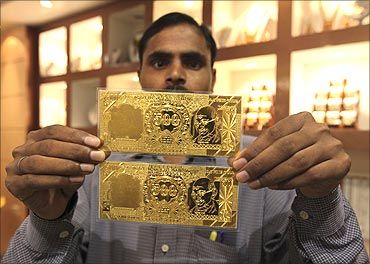If India has more billionaires than before, it is because the Indian economy began to look more attractive to FIIs, notes T N Ninan.
 The World Bank, in its report on inequality in South Asia, says that India has a disproportionate share of dollar-billionaires, and that they own a disproportionate share of the country's wealth.
The World Bank, in its report on inequality in South Asia, says that India has a disproportionate share of dollar-billionaires, and that they own a disproportionate share of the country's wealth.
Almost all those billionaires - some 50 to 60 of them - hold the bulk of their wealth as shares in the companies they manage. As those share prices rise and fall, so does billionaire wealth.
Imagine what would happen if the government banned foreign institutional investors (the famed FIIs) from the stock market. Or, which comes to the same thing, the FIIs decided to exit India for reasons of their own.
Since FIIs have long been the prime movers of the market, the stock marketwould collapse with their wholesale exit, and share prices would drop by a half or two-thirds.
That is what happened in 2008-09, when the North American financial crisis caused the FIIs to pull their money out. The Sensex crashed from 21,000 to 8,000 in 14 months. That made many billionaires into mere millionaires, and naturally reduced wealth inequality.
I'm sure the poverty-stricken millions who have no wealth were very pleased, since inequality of wealth had come down. It may be a small matter that economic growth also slowed, as did the job market.
How that helped the poor, we will have to ask the World Bank. You get the drift? There are many valid ways of assessing inequality in a society, and the World Bank looks at quite a few.
But using the number of billionaires and their wealth as a proxy makes little sense, and it is a surprise that the World Bank should adopt this populist logic.
If India has more billionaires than before (15 years ago, it had only four), it is because the Indian economy began to look more attractive to FIIs.
As they bought up stock, prices went up; the market value of all listed companies rose from less than 40 per cent of GDP to more than 80 per cent today. Naturally, the largest owners of stock, ie the promoters of companies, have been the biggest beneficiaries.
So why do the other countries of South Asia not have so many billionaires? That's simple; they don't have companies and economies that interest FIIs to the same degree. Pakistan's market capitalisation-to-GDP ratio is just 25 per cent. What about China?
That's simple too; most of China's largest companies are owned by the state or its surrogates. In India, it is entrepreneurs who have been in the driving seat. To be sure, some of them have exploited opportunities in sectors where the government has a heavy controlling hand, which puts a shadow on the ways in which they have created their wealth. But they are in a minority.
In any case, the government simply has to list companies like the Life Insurance Corporation, for the billionaires' share of stock market wealth to shrink.
Finally, bear in mind that, according to Credit Suisse's annual wealth report, 85 per cent of wealth in India is held in the form of physical assets like land; only 15 per cent is in financial form, and of that the bulk is in bank deposits.
It's different in wealthy countries, where about half the wealth is held in financial form. When you look at billionaire wealth in India, remember that it is a small part of the 15 per cent. If you go by Credit Suisse, wealth inequality in India is less than in most countries.
And yet, there should be an agenda for action. India's taxes on wealth have two large gaps. The estate duty (abolished by VP Singh) should be re-instated; so should the tax on long-term capital gains in shares (abolished by Mr Chidambaram).
Two thoughts for Mr Jaitley as he prepares his second Budget.









